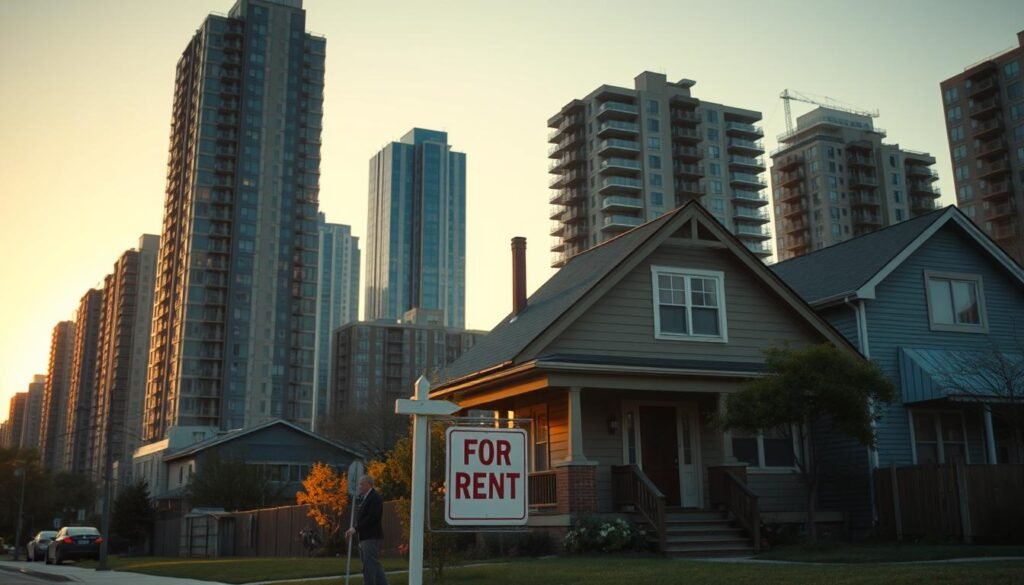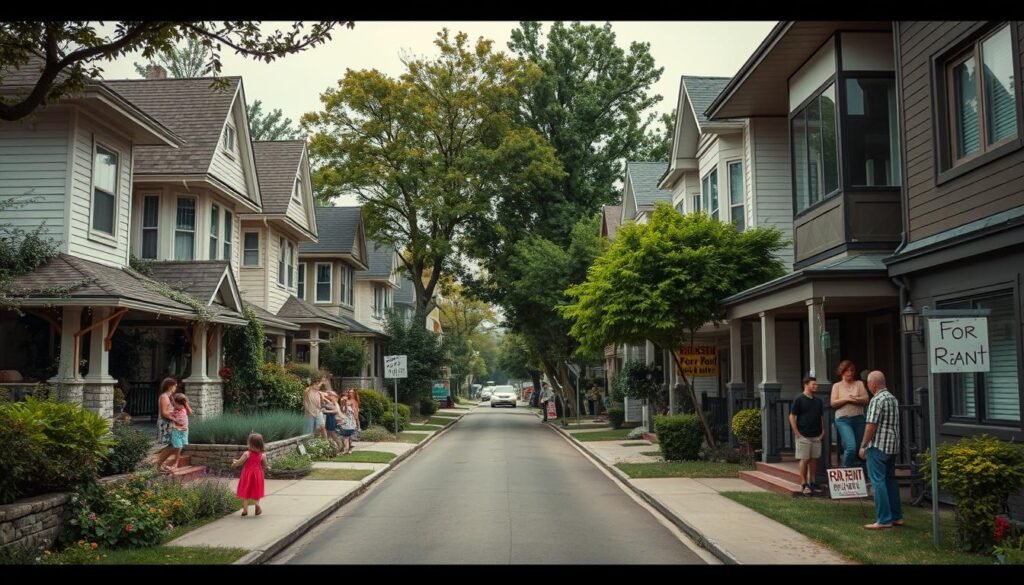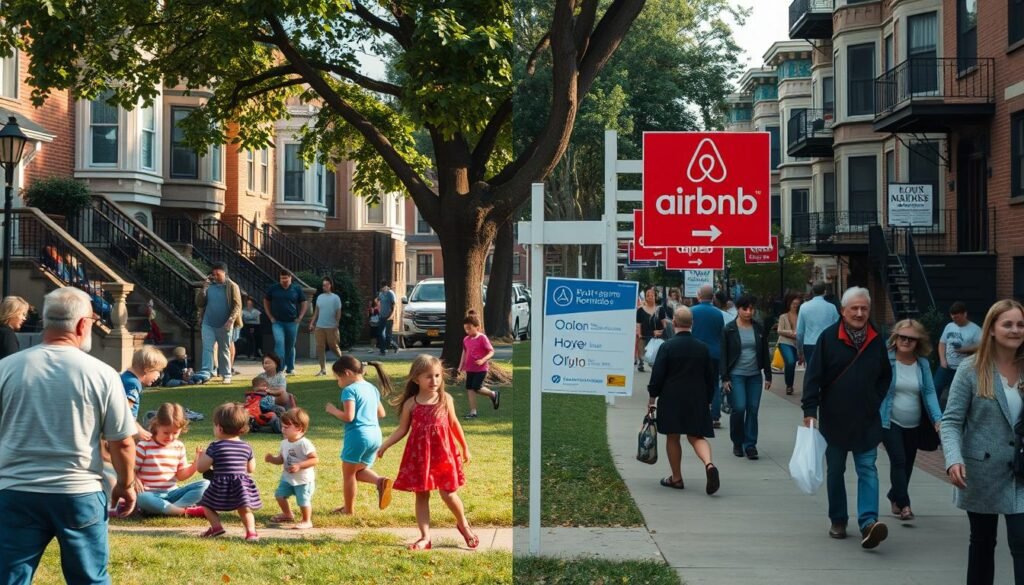In the rapidly evolving landscape of the sharing economy, the rise of short-term rental platforms like Airbnb has prompted a complex ethical debate. As more homeowners consider renting out their property to earn additional income, they find themselves grappling with the potential impact on their local communities. This ethical dilemma extends beyond personal financial gain, touching on broader societal concerns such as housing affordability, the effects of overtourism, and the delicate balance between individual rights and collective well-being.
The ability to leverage one’s home as a revenue-generating asset has undoubtedly been a boon for many homeowners. However, the proliferation of short-term rentals has also raised questions about the role of these platforms in exacerbating housing shortages, driving up rental prices, and altering the character of neighborhoods. As communities struggle to strike a balance between the economic benefits and the social costs, the ethical implications of renting on Airbnb have come under intense scrutiny.
Key Takeaways
- The rise of Airbnb and short-term rentals has created an ethical dilemma for homeowners and local communities.
- Renting on Airbnb can provide financial benefits, but it also raises concerns about housing affordability and the impact of overtourism.
- Balancing individual rights and the collective well-being of a community is a central challenge in this debate.
- Regulations and community engagement are crucial in addressing the ethical implications of short-term rentals.
- Responsible hosting practices and a consideration of the broader societal impact are essential for ethical home-sharing.
Understanding Airbnb's Business Model
In the realm of the sharing economy, Airbnb has emerged as a prominent player, revolutionizing the way people book and experience accommodations. This innovative platform connects hosts who have available spaces, such as apartments, homes, or even unique properties, with travelers seeking affordable and authentic lodging options. Understanding Airbnb’s business model is crucial in navigating the complexities and controversies surrounding the sharing economy and issues of trust and safety.
How Airbnb Works
Airbnb operates by providing an online marketplace where hosts can list their available spaces and guests can browse, compare, and book accommodations that suit their needs and preferences. The platform simplifies the booking process, allowing hosts to manage their listings and communicate with guests, while guests can read reviews, view photos, and easily book their desired accommodations.
The Role of Hosts
Airbnb’s success is largely dependent on the participation of its hosts, who play a crucial role in the platform’s operations. Hosts are responsible for maintaining their listings, ensuring guest safety, and providing a positive experience for travelers. They set their own prices, manage bookings, and adhere to Airbnb’s policies and guidelines to maintain the trust and safety of the platform.
Benefits for Guests
For guests, Airbnb offers a range of benefits that have contributed to its popularity. Travelers can often find more affordable and unique accommodation options compared to traditional hotels, allowing them to immerse themselves in local communities and experiences. Additionally, the platform’s user-friendly interface and review system provide guests with valuable information to make informed decisions and build trust in the accommodations they choose.
| Key Benefits of Airbnb for Guests | Key Benefits of Airbnb for Hosts |
|---|---|
|
|
While Airbnb’s business model has proven successful, it has also faced various controversies and challenges related to the sharing economy and issues of trust and safety. Understanding these complexities is essential in evaluating the platform’s impact and the ethical considerations surrounding home rentals.
The Boom of Short-Term Rentals
The rapid growth of short-term rental platforms like Airbnb has had a profound impact on the hospitality industry, disrupting traditional lodging options and transforming urban tourism. This boom has brought both positive and negative implications for local communities, challenging the delicate balance between economic benefits and the overtourism impact.
Economic Impact on Local Communities
The influx of short-term rentals has created new opportunities for homeowners to generate supplemental income, often providing a lucrative alternative to long-term leasing. This additional revenue stream has the potential to support local economies, as hosts may reinvest their earnings into the community. However, the proliferation of short-term rentals has also led to concerns about the hospitality industry disruption, as they compete with traditional lodging options such as hotels and bed and breakfasts.
Increased Tourism in Urban Areas
The availability of short-term rentals has made it more accessible for travelers to explore urban areas, leading to an increase in tourism in many cities. This has brought economic benefits, as visitors contribute to local businesses, restaurants, and cultural attractions. Yet, the overtourism impact has also strained infrastructure, housing availability, and the quality of life for residents in some communities, leading to growing concerns about the long-term sustainability of this trend.
Competition with Traditional Lodging
| Factors | Short-Term Rentals | Traditional Lodging |
|---|---|---|
| Pricing | Often more affordable for travelers | May be more expensive, but offer amenities and services |
| Regulation | Varies by location, often less stringent | Heavily regulated to ensure safety and compliance |
| Guest Experience | Offers a unique, “home-away-from-home” experience | Provides consistent, professional hospitality services |
As the short-term rental market continues to grow, the hospitality industry disruption has led to increased competition with traditional lodging options. This has prompted ongoing debates about the appropriate level of regulation and the need to balance the interests of hosts, guests, and the broader community.

Ethical Concerns Surrounding Home Rentals
As the popularity of home rentals continues to rise, there are growing concerns about the ethical implications of this trend. One of the primary issues is the impact on housing affordability and community disruption. The influx of short-term rentals in desirable neighborhoods can lead to gentrification and displacement, as landlords prioritize more lucrative vacation rentals over long-term housing for local residents.
Gentrification and Displacement
The prevalence of Airbnb-style rentals in certain areas can drive up housing prices, making it increasingly difficult for low-income and even middle-class families to afford to live in these communities. This process of gentrification can displace long-term residents who can no longer afford the rising rents, disrupting the social fabric of the neighborhood and eroding a sense of community.
The Effect on Housing Prices
Research has shown that the growth of short-term rentals can have a significant impact on local housing prices. A study by the Economic Policy Institute found that a 1% increase in Airbnb listings leads to a 0.018% increase in rents and a 0.026% increase in home prices. This trend can exacerbate the existing housing affordability crisis in many urban areas.
Cultural Commodification
Another ethical concern is the potential for home rentals to contribute to the commodification of local culture. When neighborhoods become overrun with vacation rentals, the character and authenticity of the community can be diluted, as residents are replaced by a constant influx of transient visitors. This can lead to the commercialization of cultural experiences, depriving locals of the ability to fully engage with and preserve their own heritage.
Addressing these ethical challenges will require a balanced approach that considers the needs of both homeowners and the broader community. Policymakers, community organizations, and rental platforms must work together to find solutions that protect housing affordability and maintain the integrity of local neighborhoods.

| Ethical Concern | Impact | Potential Solutions |
|---|---|---|
| Gentrification and Displacement | Disruption of local communities, loss of affordable housing | Stricter regulations on short-term rentals, incentives for long-term housing |
| Effect on Housing Prices | Increased rents and home prices, exacerbating housing affordability crisis | Rent control measures, tax policies to discourage investment properties |
| Cultural Commodification | Erosion of local character and authenticity, commercialization of cultural experiences | Promoting local business and community initiatives, educational campaigns |
Legal Implications of Renting on Airbnb
Navigating the legal landscape of short-term rentals can be a complex and nuanced endeavor. As the popularity of platforms like Airbnb continues to grow, hosts must understand the varying regulations and local ordinances that govern their rental activities. The legal implications of renting on Airbnb can have a significant impact on both hosts and the surrounding communities.
Regulations Vary by City
One of the key challenges for Airbnb hosts is the lack of standardized regulations across different cities and jurisdictions. Short-term rental regulations can vary greatly, with some municipalities imposing strict rules and others maintaining a more lenient approach. It is crucial for hosts to research and comply with the specific laws and guidelines within their local area to avoid potential legal issues.
The Impact of Local Ordinances
Local ordinances can have a profound effect on the operational aspects of short-term rentals. These ordinances may dictate the number of days a property can be rented, the required permits or licenses, and even the types of properties that are eligible for short-term rentals. Landlord responsibilities can also be impacted by these local regulations, as hosts may be required to provide specific information or adhere to certain safety standards.
Liability and Insurance Issues
Renting on Airbnb can also raise liability concerns for hosts. Hosts may be held responsible for any accidents, injuries, or damages that occur during a guest’s stay. Proper insurance coverage is essential to mitigate these risks, but the specific requirements can vary depending on local laws and the platform’s own policies.
Overall, the legal implications of short-term rentals are a critical consideration for Airbnb hosts. By understanding the various regulations, ordinances, and liability issues, hosts can ensure they are operating within the bounds of the law and prioritizing the safety and wellbeing of their guests and the surrounding community.

Host Responsibilities and Obligations
As the popularity of short-term home rentals continues to grow, Airbnb hosts must acknowledge their responsibilities and obligations to ensure a positive experience for both guests and the local community. From ensuring guest safety to maintaining property standards and fostering transparency with neighbors, the role of an Airbnb host carries significant weight.
Ensuring Guest Safety
At the core of an Airbnb host’s duties is the responsibility to provide a safe and secure environment for their guests. This includes thoroughly vetting guests, implementing robust security measures, and having clear emergency protocols in place. Hosts must also be vigilant in addressing any safety concerns that may arise during a guest’s stay.
Maintaining Property Standards
Airbnb hosts are expected to maintain their properties to a high standard, ensuring cleanliness, functionality, and overall appeal. This goes beyond just the interior of the home; it also extends to the external areas, such as the yard and any shared spaces. Regularly inspecting the property and promptly addressing any issues is crucial for upholding the trust and safety that guests expect.
Transparency with Neighbors
Responsible Airbnb landlord responsibilities also involve fostering open communication and transparency with the surrounding community. Hosts should strive to maintain good relationships with their neighbors, addressing any concerns or complaints that may arise from short-term rentals. By being proactive and responsive, hosts can help mitigate the potential for disruptions or conflicts.
“Airbnb hosting is not just about earning extra income – it’s about being a responsible steward of your property and a considerate member of the community.”
As the trust and safety of both guests and the local community are paramount, Airbnb hosts must approach their role with a strong sense of landlord responsibilities. By upholding these ethical standards, hosts can contribute to the sustainable growth of the short-term rental industry while fostering positive relationships within their neighborhoods.

The Impact on Local Communities
The rise of short-term rentals, fueled by platforms like Airbnb, has had a profound impact on local communities across the globe. As more homeowners convert their properties into vacation rentals, the ripple effects on neighborhood dynamics and community engagement have become increasingly apparent.
Strained Neighborhood Relations
The influx of transient guests in residential areas has led to a strain on neighborhood relations. Frequent turnover of tenants, combined with a lack of investment in the community, can create a sense of disconnection and instability. Residents often report increased noise, litter, and disruptive behavior from short-term rental guests, leading to frustration and resentment within the community.
Noise and Disturbance Issues
One of the most significant challenges faced by local communities is the issue of noise and disturbance caused by short-term rental guests. Parties, late-night gatherings, and even everyday activities like suitcase rolling can disrupt the peace and quiet that residents have come to expect in their neighborhoods. This disruption can have a profound impact on the quality of life for those living in close proximity to short-term rentals.
Community Engagement and Support
The growth of short-term rentals has also posed challenges for local community organizations and support systems. Increased demand for public services, such as waste management and emergency response, can strain municipal budgets and resources. Additionally, the transient nature of short-term rental guests can make it difficult to foster a sense of community and civic engagement, as residents may feel less invested in the long-term well-being of the neighborhood.
To address these issues, local communities are exploring various strategies to mitigate the impact of short-term rentals, such as implementing stricter regulations, enhancing community outreach and education, and encouraging greater collaboration between hosts, guests, and residents.

Balancing Profit and Ethics
As the popularity of home rentals through platforms like Airbnb continues to grow, there is an increasing need to balance the pursuit of personal financial gain with the ethical considerations surrounding the impact on local communities. This delicate equilibrium is at the heart of the ongoing discussions around the ethical dilemma of renting your home on Airbnb and the broader sharing economy controversies.
Assessing Financial Benefits
The lucrative potential of renting out one’s home on Airbnb is undeniable. Hosts can earn significant supplementary income, especially in popular tourist destinations or during peak travel seasons. This financial incentive has been a key driver behind the rapid expansion of the short-term rental market. However, the question remains: at what cost to the local community?
Weighing Community Impact
While Airbnb hosts may reap the financial rewards, the long-term consequences for the surrounding neighborhoods cannot be ignored. Gentrification, rising housing prices, and the disruption of community dynamics are just some of the ethical concerns that have been raised. Airbnb’s impact on local culture and the displacement of permanent residents are also crucial factors to consider.
Long-Term vs. Short-Term Gains
The dilemma lies in reconciling the short-term financial gains of home rentals with the potential long-term detriment to the community. Hosts must weigh the allure of immediate profits against the collective well-being of their neighborhoods. This delicate balance is at the heart of the ongoing debate surrounding the ethical implications of the sharing economy.
| Metric | Short-Term Gains | Long-Term Impact |
|---|---|---|
| Financial Earnings | High | Moderate to Low |
| Community Engagement | Low | High |
| Neighborhood Stability | Low | Moderate to High |
| Cultural Preservation | Low | Moderate to High |
As the landscape of home rentals continues to evolve, it is crucial for Airbnb hosts and policymakers to strike a delicate balance between profitability and the ethical considerations that impact local communities. Navigating this complex issue will require a multifaceted approach that prioritizes the long-term well-being of neighborhoods while acknowledging the financial needs of individual hosts.

Addressing Misconceptions About Airbnb
The rapid growth of home-sharing platforms like Airbnb has led to a range of misconceptions about the hospitality industry disruption. It’s crucial to understand the diverse nature of Airbnb hosts and guests, as well as to debunk common myths surrounding the platform’s impact on communities.
Distinguishing Between Superhosts and Casual Hosts
Airbnb hosts span a broad spectrum, from professional “superhosts” who manage multiple properties to casual homeowners renting out a spare room. While the former group may raise concerns about the commodification of housing, the latter often rely on Airbnb income to make ends meet. Recognizing this distinction is key to addressing the nuances of Airbnb’s role in the hospitality industry.
Understanding the Guest Perspective
Guests choose Airbnb for a variety of reasons, from seeking unique experiences to finding more affordable accommodations. Many value the personal touch and sense of community that Airbnb can provide, which challenges the perception of the platform as purely profit-driven. Considering the guest experience sheds light on Airbnb’s potential to enhance trust and safety in the hospitality industry.
Common Myths Debunked
Misconceptions about Airbnb often stem from a lack of understanding about the platform’s operations and its impact on local communities. For example, the belief that Airbnb leads to widespread gentrification or disrupts the affordable housing supply is not universally true. Careful examination of the data and local regulations can help dispel these myths and promote a more balanced perspective.
By addressing these common misconceptions, we can gain a deeper understanding of Airbnb’s role in the hospitality industry and the multifaceted impact it has on communities. This knowledge is crucial for developing ethical and sustainable solutions that balance the needs of hosts, guests, and local residents.

The Voice of Local Residents
As the short-term rental market continues to grow, the impact on local communities has become a pressing issue. Residents in neighborhoods affected by the rise of platforms like Airbnb have voiced their concerns, shedding light on the complex challenges posed by the community disruption and overtourism impact of these rental platforms.
Gathering Community Feedback
Community organizations have played a crucial role in amplifying the voices of local residents. Through town hall meetings, online surveys, and open dialogues, these organizations have gathered valuable feedback from the people most affected by the influx of short-term rentals in their neighborhoods.
Resident Concerns and Complaints
- Increased noise and disturbance from transient guests
- Concerns about safety and security in residential areas
- Dwindling sense of community as long-term residents are displaced
- Rising housing costs and limited availability of affordable housing
The Role of Community Organizations
Community organizations have been instrumental in advocating for the rights of local residents and pushing for responsible regulations around short-term rentals. They have worked to amplify the voices of their constituents, facilitate discussions with policymakers, and explore collaborative solutions to address the negative impacts of the short-term rental industry.
“The rise of short-term rentals has fundamentally changed the character of our neighborhood. We need to find a balance between supporting local economies and preserving the vibrant communities that make our city a great place to live.”

The Role of Airbnb in Social Issues
As the sharing economy continues to evolve, Airbnb has found itself at the intersection of various social issues. From supporting local economies to addressing challenges in inequality and environmental sustainability, the platform’s impact extends far beyond the realm of short-term rentals.
Supporting Local Economies
One of the notable ways Airbnb has contributed to social issues is by supporting local economies. By enabling homeowners to earn extra income through home-sharing, Airbnb has provided a lifeline for many individuals and families struggling with housing affordability. This influx of additional revenue has the potential to boost spending at local businesses, creating a ripple effect that strengthens the overall economic fabric of communities.
Challenges in Inequality
However, the rise of Airbnb has also brought to light the complex issue of inequality. Critics argue that the platform’s growth has exacerbated the existing divide, with affluent homeowners reaping the financial benefits while lower-income residents face the consequences of rising housing prices and gentrification. This has led to ongoing debates about the platform’s role in fueling these societal imbalances.
Environmental Sustainability Initiatives
On a more positive note, Airbnb has made strides in addressing environmental sustainability concerns. The company has introduced initiatives aimed at reducing the carbon footprint of travel, such as encouraging eco-friendly practices among hosts and promoting sustainable tourism experiences. By aligning with the growing demand for responsible travel, Airbnb is positioning itself as a leader in the industry’s efforts to mitigate its environmental impact.
As Airbnb continues to navigate the complexities of the sharing economy controversies, its ability to strike a balance between profitability and social responsibility will be crucial in determining its long-term impact on local communities and the broader societal landscape.

| Metric | Value |
|---|---|
| Housing Affordability Index (2022) | 137.7 |
| Airbnb Hosts Earning Supplemental Income | 55% |
| Airbnb’s Carbon Footprint Reduction Target (by 2030) | 30% |
Comparisons to Traditional Renting
As the short-term rental market continues to grow, it’s important to compare the experience of renting on platforms like Airbnb to the more traditional long-term lease agreements. While both offer housing solutions, there are distinct differences in the rental agreements, tenant rights and responsibilities, and the role of real estate agents.
Differences in Rental Agreements
Traditional rental agreements often involve a landlord-tenant contract that spans several months or years, with set terms and conditions regarding rent, security deposits, and maintenance responsibilities. In contrast, short-term rentals typically involve a more flexible, day-to-day arrangement, where guests may book accommodations for just a few nights or weeks at a time.
Tenant Rights and Responsibilities
Tenants in long-term leases have well-defined rights and obligations, such as the right to a habitable living space and the responsibility to pay rent on time. The rights and responsibilities of short-term rental guests, however, can be less clear-cut, as they may not have the same legal protections as traditional tenants.
The Role of Real Estate Agents
In the traditional rental market, real estate agents often play a significant role in connecting landlords and tenants, handling the lease process, and serving as intermediaries. In the short-term rental space, the role of real estate agents has evolved, with some agents specializing in managing and optimizing Airbnb and similar properties on behalf of hosts.
| Aspect | Traditional Renting | Short-Term Rentals |
|---|---|---|
| Rental Agreement | Long-term, fixed contract | Flexible, day-to-day arrangement |
| Tenant Rights | Well-defined legal protections | Less clear-cut, may have fewer protections |
| Role of Real Estate Agents | Significant in connecting landlords and tenants | Evolving, with some agents specializing in short-term rentals |
As the short-term rental market continues to evolve, it’s essential for both hosts and guests to understand the differences between traditional renting and the unique landscape of Airbnb and similar platforms. By being informed about these distinctions, individuals can make more informed decisions about their housing options and navigate the complexities of the rental market.

The Future of Home Rentals
As the hospitality industry continues to evolve, the landscape of home rentals is poised to undergo significant transformations. With the rising popularity of short-term rental platforms like Airbnb, the future of this industry is marked by a shift in consumer preferences and the potential for increased regulation.
Trends in Short-Term Rentals
The short-term rental market has experienced a surge in recent years, driven by the convenience and flexibility it offers travelers. Industry experts predict that this trend will continue, with an expected increase in the number of listings and a diversification of property types, catering to a wider range of guest preferences. However, this growth may be tempered by the ongoing short-term rental regulations implemented by various municipalities, aimed at addressing the potential disruptions to local communities.
The Shift in Consumer Preferences
Consumers increasingly value experiences over traditional accommodations, leading to a shift in preferences towards short-term rentals. Travelers seek unique, locally-immersive experiences, often found in private homes and apartments, rather than standardized hotel rooms. This trend is expected to continue, as the hospitality industry disruption prompted by the rise of home rental platforms evolves to meet the changing demands of modern travelers.
Potential Regulation Changes
- Ongoing debates surrounding short-term rental regulations, with some cities and municipalities implementing stricter rules to address the impact on local housing markets and communities.
- Potential for increased taxation and licensing requirements for home rental hosts, aiming to level the playing field with traditional hospitality businesses.
- Calls for greater transparency and accountability from home rental platforms, ensuring responsible practices and mitigating the negative effects on local neighborhoods.
As the home rental industry continues to navigate these dynamic changes, striking a balance between the needs of hosts, guests, and local communities will be crucial in shaping the future of this rapidly evolving sector.

Ethical Considerations for Travelers
As the popularity of short-term rentals continues to rise, travelers are faced with important ethical considerations when booking their accommodations. Responsible tourism practices and an awareness of the local impact are crucial in ensuring a positive experience for both the traveler and the host community.
Responsible Tourism Practices
Travelers using short-term rentals should strive to be mindful and respectful of the local culture and community. This includes following local regulations, being considerate of neighborhood noise levels, and treating the rental property with care. Travelers can also contribute to the local economy by supporting small businesses and locally-owned enterprises.
Awareness of Local Impact
Travelers should be cognizant of the potential overtourism impact that their presence can have on the local community. This includes being aware of issues such as gentrification, displacement of long-term residents, and the potential strain on community resources. By understanding these challenges, travelers can make more informed decisions and minimize their negative impact.
Supporting Local Businesses
One of the ways travelers can positively contribute to the local community is by supporting small, locally-owned businesses. This can include dining at local restaurants, shopping at independent stores, and utilizing local tourism services. This not only helps to build trust and safety within the community but also promotes economic sustainability.
By adopting these responsible tourism practices and being mindful of the local impact, travelers can enjoy the benefits of short-term rentals while also contributing to the overall well-being of the host community.

The Debate Over Regulation
The rapid growth of the short-term rental industry, fueled by platforms like Airbnb, has sparked a contentious debate over the need for stricter regulations. Advocates for tighter rules argue that these rentals contribute to issues like gentrification, housing affordability, and neighborhood disruption. On the other hand, opponents of overregulation caution against stifling innovation and limiting homeowners’ property rights.
Advocates for Stricter Laws
Many cities and communities have implemented or are considering stricter regulations on short-term rentals. Proponents of these measures cite the need to protect affordable housing and maintain the character of residential neighborhoods. They argue that unregulated short-term rentals can lead to a decline in available long-term rental units, driving up housing costs and displacing local residents.
Arguments Against Overregulation
Critics of heavy-handed regulation counter that short-term rentals provide valuable income for homeowners and contribute to the local economy through increased tourism. They contend that strict rules, such as caps on the number of rental nights or the requirement for hosts to obtain permits, could unfairly punish responsible homeowners and stifle the growth of the short-term rental regulations industry.
Seeking Middle Ground
- Balanced approach: Some cities have sought to strike a balance, implementing regulations that address specific concerns while still allowing for the continued growth of the short-term rental market.
- Collaboration with industry: Policymakers are working with Airbnb and other platforms to develop guidelines that promote responsible hosting and mitigate the impact on housing affordability.
- Emphasis on enforcement: Regulations may be more effective if they focus on enforcing existing laws, such as those related to noise, safety, and zoning, rather than creating new, complex rules.
As the debate over short-term rental regulations continues, communities must weigh the potential benefits and drawbacks to find a solution that balances the interests of homeowners, guests, and local residents.

Collaborative Solutions for Communities
As the debate around short-term rentals and their impact on local communities continues, it’s clear that a collaborative approach is needed to find sustainable solutions. By engaging stakeholders in open dialogue, communities can work together to address the challenges posed by services like Airbnb, balancing the benefits of tourism with the concerns of neighborhood disruption and landlord responsibilities.
Engaging Stakeholders in Dialogue
Effective solutions require input from all affected parties, including Airbnb hosts, local residents, city officials, and community organizations. By fostering open and transparent discussions, communities can identify the root causes of issues and work collaboratively to develop tailored strategies that address the unique needs of their neighborhoods.
Best Practices for Hosts
While the responsibilities of Airbnb hosts can be a source of contention, establishing clear guidelines and promoting responsible hosting practices can help mitigate the impact on local communities. This may include measures such as noise control, guest vetting, and transparent communication with neighbors.
Community Support Programs
To further address the challenges of community disruption and landlord responsibilities, some communities have implemented support programs that provide resources and assistance to both hosts and residents. These initiatives can range from educational workshops to mediation services, empowering stakeholders to find mutually beneficial solutions.
| Stakeholder Engagement Strategies | Best Practices for Hosts | Community Support Programs |
|---|---|---|
|
|
|
By fostering collaborative solutions that engage all stakeholders, communities can strike a balance between the benefits of short-term rentals and the need to preserve the character and livability of their neighborhoods.

Conclusion: A Balanced Perspective
As we’ve explored the intricate ethical landscape surrounding home rentals on Airbnb, it’s clear that there are no simple solutions. The sharing economy controversies have highlighted the need for a balanced approach that considers the diverse perspectives of hosts, guests, and local communities.
Assessing the Ethical Landscape
The ethical dilemma of renting your home on Airbnb encompasses a range of concerns, from gentrification and displacement to the impact on housing prices and cultural commodification. While the financial benefits for hosts are undeniable, the broader social and economic implications demand careful consideration.
Promoting Responsible Renting
To address these complexities, it’s crucial that hosts prioritize responsible renting practices. This includes ensuring guest safety, maintaining property standards, and promoting transparency with neighbors. By fostering a culture of accountability, the home rental industry can work towards mitigating the negative impacts on local communities.
The Role of Education and Advocacy
Ultimately, the path forward requires a collaborative effort involving all stakeholders. Through ongoing education and advocacy, we can dispel misconceptions, empower hosts to make informed decisions, and engage local residents in shaping the future of home rentals. By working together, we can strive to achieve a balanced perspective that benefits individuals, communities, and the sharing economy as a whole.
FAQ
What is Airbnb’s business model and how does it work?
Airbnb is a platform that connects property owners (hosts) with travelers (guests) seeking short-term accommodations. Hosts list their properties on the Airbnb platform, setting their own prices and availability. Guests can then browse and book these listings for their travel needs. Airbnb earns a commission from each booking made through its platform.
What are the benefits of renting on Airbnb for both hosts and guests?
For hosts, renting on Airbnb can provide a supplementary income stream and the flexibility to earn money from their property. Guests, on the other hand, benefit from the wide range of accommodations available, often at more competitive prices than traditional hotels, as well as the potential for a more authentic local experience.
How has the boom in short-term rentals impacted local communities?
The rapid growth of short-term rentals has had both positive and negative impacts on local communities. On the positive side, it has contributed to increased tourism and economic activity in some areas. However, it has also been linked to issues such as gentrification, rising housing prices, and the disruption of neighborhood dynamics.
What are the ethical concerns surrounding home rentals on Airbnb?
The ethical concerns include the potential for gentrification and displacement of long-term residents, the impact on housing affordability, and the commodification of local cultures. There is also a debate around the fairness of short-term rentals compared to traditional hotel accommodations and the disruption they can cause in residential neighborhoods.
How do regulations vary for short-term rentals across different cities?
Regulations for short-term rentals can vary significantly by location. Some cities have implemented strict regulations, such as requirements for host registration, limits on the number of rental days, and zoning restrictions. Other cities have a more hands-off approach, allowing short-term rentals with minimal oversight. Hosts must be aware of and comply with the local ordinances in their area.
What are the key responsibilities and obligations for Airbnb hosts?
Airbnb hosts have several responsibilities, including ensuring guest safety, maintaining property standards, and being transparent with their neighbors about hosting activities. Hosts must also comply with applicable laws and regulations, manage bookings and guest interactions, and strive to provide a positive experience for their guests.
How do short-term rentals impact local community dynamics and relationships?
The influx of short-term rental guests in residential neighborhoods can strain community relations, leading to issues like noise disturbances, parking problems, and the feeling of a loss of community character. This can create tensions between hosts, guests, and long-term residents. Fostering open communication and community engagement is important to address these challenges.
How can Airbnb hosts balance the financial benefits with the ethical considerations of home rentals?
Balancing the financial gains from short-term rentals with the potential negative impacts on the community is a complex challenge. Hosts must carefully assess the long-term consequences of prioritizing short-term profits over the well-being of their local neighborhoods. Weighing the financial benefits against the community impact is crucial in making ethical decisions about home rentals.
What are some common misconceptions about Airbnb and short-term rentals?
Common misconceptions include the belief that all Airbnb hosts are “superhosts” running large-scale operations, when in reality many are casual hosts renting out their primary residences. There are also misconceptions about the guest experience, with some assuming it is always inferior to traditional hotel stays.
How can local residents voice their concerns about short-term rentals in their communities?
Local residents can engage with community organizations, attend public meetings, and provide feedback to policymakers to express their concerns about the impact of short-term rentals. Gathering community input and working collaboratively with hosts, guests, and officials is important for addressing the challenges posed by short-term rentals.
In what ways can Airbnb and short-term rentals impact broader social issues?
Airbnb and the short-term rental industry have the potential to both support and challenge social issues. On the positive side, they can contribute to local economic development and provide income opportunities for hosts. However, they have also been linked to exacerbating housing affordability issues and inequality, as well as presenting environmental sustainability challenges.
How do short-term rentals differ from traditional long-term renting arrangements?
The key differences include the nature of rental agreements, tenant rights and responsibilities, and the role of real estate professionals. Short-term rentals typically involve more flexible, transaction-based arrangements, while traditional long-term leases provide more stability and established landlord-tenant frameworks.
What are some of the emerging trends and potential future changes in the home rental market?
Trends in the home rental market include the continued growth of short-term rentals, the shift in consumer preferences toward more experiential and locally-immersive travel, and the potential for further regulatory changes as cities and communities grapple with the impacts of the short-term rental industry.
What are the ethical considerations and responsibilities for travelers using short-term rentals?
Travelers using short-term rentals have an ethical responsibility to be mindful of their impact on local communities. This includes practicing responsible tourism, being aware of the local consequences of their stay, and supporting local businesses and economies rather than solely prioritizing the convenience and cost-savings of short-term rentals.
What are the key arguments and perspectives in the ongoing debate over short-term rental regulations?
The debate over short-term rental regulations involves various stakeholders and perspectives. Proponents of stricter regulations argue for the need to address issues like housing affordability and community disruption, while opponents warn against overregulation that could stifle innovation and economic opportunities. Finding a balanced approach that considers the needs of both individuals and communities is a central challenge in this ongoing debate.
How can communities, hosts, and other stakeholders collaborate to find solutions to the challenges posed by short-term rentals?
Collaborative solutions involve engaging all relevant stakeholders, including local residents, Airbnb hosts, and policymakers, in open dialogues to identify and address the challenges. This may include developing best practices for responsible hosting, implementing community support programs, and fostering ongoing communication to find balanced solutions that benefit both individuals and the broader community.



